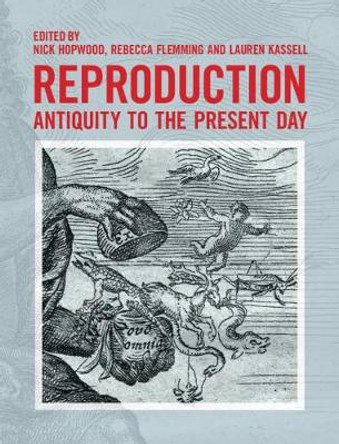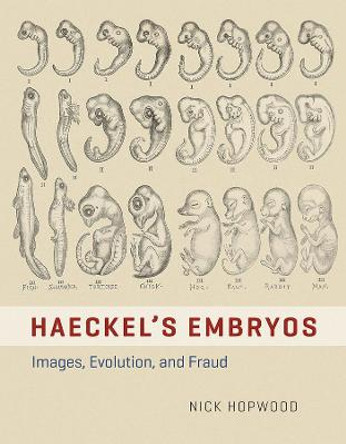Description
Authoritative, accessible and abundantly illustrated, this book presents a broad history of reproduction over the long term.
About the Author
Nick Hopwood is Professor of History of Science and Medicine at the University of Cambridge. He is author of Haeckel's Embryos: Images, Evolution, and Fraud (2015), which won the 2016 Suzanne J. Levinson Prize of the History of Science Society. Rebecca Flemming is Senior Lecturer in Ancient History at the University of Cambridge. She has published widely on medicine and gender in antiquity, including Medicine and the Making of Roman Women: Gender, Nature, and Authority from Celsus to Galen (2000). Lauren Kassell is Reader in History of Science and Medicine at the University of Cambridge and directs the Casebooks Project. Her publications include Medicine and Magic in Elizabethan London: Simon Forman, Astrologer, Alchemist, and Physician (2005).
Reviews
'A fascinating work of breath taking ambition. It is certain to become a key point of reference for scholars working in a wide range of disciplines.' Sally Sheldon, FAcSS, University of Kent
'This ambitious and extraordinarily well-executed volume offers new and rich insights into the history of reproduction from the ancient world to the modern period. Drawing on the best scholarship, it provides a compendium, a stimulating reframing of the field, and a state-of-the-art guide to further research.' Hilary Marland, University of Warwick
'This is the most ambitious and comprehensive treatise on reproduction that has ever been attempted within the compass of a single volume. It is challenging to think of a perspective that has not been addressed. The impressive range of contributions and illustrations should guarantee the book a very wide appeal.' Sir Richard Gardner, FRS, Emeritus Royal Society Research Professor
'A milestone in reproduction studies, this magnum opus will be invaluable to scholars from multiple disciplines as both resource and inspiration for ambitious projects and innovative approaches. At once dense and refreshing, it mobilizes efforts of superb scholars to bring us up-to-date historically, transnationally and transculturally, powerfully demonstrating the centrality of reproduction in human life.' Adele E. Clarke, Professor Emerita of Sociology and History of Health Sciences, University of California, San Francisco
'This remarkably wide-ranging and lavishly illustrated history takes in everything from 'phallic fertility in the Ancient Near East and Egypt' and 'women and doctors in Ancient Greece' to population in an era of climate change, artificial fertilisation and globalisation. Among countless other topics, the dozens of contributors explore astrological medicine; our developing understanding of both 'generation' and 'reproduction'; ignorance and infertility; hormones, prenatal diagnosis and pregnancy testing with frogs; even Aristotle's strange theory that hyenas are hermaphrodite. The result is a stunning and scholarly overview of one of the central aspects of human life.' Times Higher Education
'... [a] studious, insightful brainstorm of research and revelation into an often sensitive topic. Highly recommended, especially for college and university library World History and Social Issues collections.' Library Bookwatch
'It is hard to do justice to a book of such size, complexity and range ... In this project, an international group of scholars has combined to produce what has turned into an authoritative, impressive volume.' Anne Crowther, Times Literary Supplement
'By looking at the history of generation and reproduction across such a large chronological scale, such a large thematic scope (from egg to population), and in such a variety of geographical spaces, Reproduction allows us to better understand the complexity of our current world and opens up new ways of thinking about sexuality and ways of procreating ... It also equips us intellectually to reflect on current issues surrounding reproduction and to develop a critical attitude toward contemporary developments in this domain. Moreover, Reproduction provides us with an excellent pedagogical tool, which is likely to help us to renew and refresh our teaching in the history of the life sciences and medicine. No doubt, this book constitutes a large and rich source of texts that will be relevant to teach and trigger discussions during seminar readings.' Marion Thomas, H-Net
'The scholarship throughout is at the highest level, the writing is engaging and informative, and the volume is lavishly illustrated ... As a single-volume history of reproduction, Reproduction could not be better. It is sure to become a valuable resource for anyone engaged with the history of sexuality.' Ian Frederick Moulton, Journal of the History of Sexuality
'While illustrations are found throughout the book, the inclusion of exhibits in Reproduction is one of its greatest strengths ... Reproduction ... include[s] ... a remarkable range of subjects from an impressive group of scholars. The editors have deftly organized this material, which ranges over such a long timeframe, into a coherent whole ...' R. Allen Shotwell, Early Science and Medicine
'Reproduction builds a new synthesis of how Europeans have understood the production and renewal of life. Of particular note is the complex interweaving of the contributors' collective arguments; by engaging with each other's work, the chapters form a set of discussions where new connections and contrasts can be found beyond those normally developed in studies of more limited historical and geographical scope... Triangulating the chapters with their illustrations and the free-standing object exhibits allows readers to build complex paths through the narrative of Western attitudes to birth, reproduction and population. In sum, Reproduction is a sophisticated and comprehensive work that simultaneously summarises a generation's work in the history of science and, by the very fact of its synthesis, breaks new ground. The editors are to be thanked for the scale of their ambition for this project as is the publisher for honouring that ambition by the generous production standards the book embodies. Reproduction will become a standard work of reference but should also become a core teaching text for advanced undergraduate courses in medical history, the history of population and gender studies.' Robert J. Mayhew, Journal of Historical Geography
'Reproduction is an encyclopaedic book that is not an encyclopaedia; it is a great attempt to return to the ambitious projects of the longue duree and to tackle them from the multidisciplinary perspective of total history. A book recommended for students of the history of science, but also for professionals concerned with reproduction today.' Raul Velasco Morgado, Dynamis
'It is difficult to do justice to Reproduction's utterly unparalleled scale and ambition, and, consequently, it is difficult to avoid bad puns, for this truly is a seminal volume. It is a hugely impressive achievement. Reproduction provides exceptional entry points for students and non-specialists while setting dozens of specialist research agendas as well as some big ones.' Zubin Mistry, Gender & History
'The exhibits provide much more accessible material for teaching ... graduate students ... will find plenty of inspiration and useful bibliographic materials, and scholars who teach in the area will want this collection on their bookshelves. The collection would be of particular use to modernists who want to beef up their knowledge of premodern 'generation' to enhance their research and supplement their teaching.' Lara Freidenfelds, History of Science, Technology, and Medicine
Book Information
ISBN 9781107068025
Author Nick Hopwood
Format Hardback
Page Count 766
Imprint Cambridge University Press
Publisher Cambridge University Press
Weight(grams) 2060g
Dimensions(mm) 252mm * 192mm * 44mm










